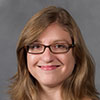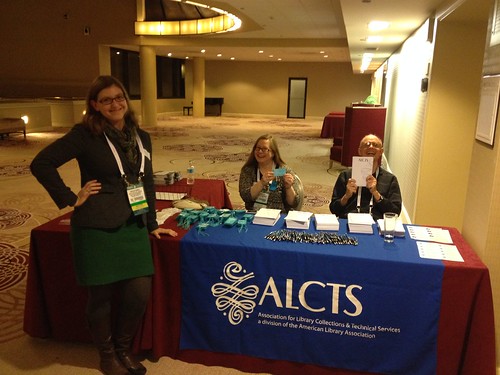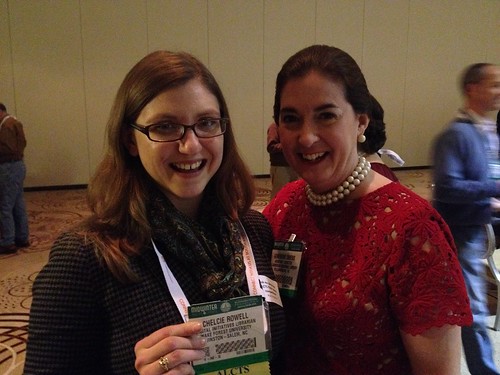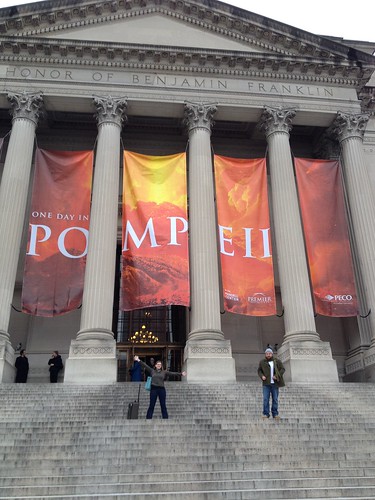This article is more than 5 years old.
This was my first ALA conference as a librarian rather than a student and my first ALA as an interest group chair. Since I was back in Philly, where I lived between college and library school, I also had the chance to catch up with one of my mentors, Elizabeth Fuller, librarian at the Rosenbach Museum & Library.
ALCTS Photo Scavenger Hunt
This year ALCTS sponsored a photo scavenger hunt on Flickr. I snapped photos of designated ALCTS programs, events, and people and Philadelphia landmarks in order to compete for great prizes such as ALA Store vouchers and ALCTS continuing education credit. The winners haven’t been announced yet, but my fingers are crossed! Below are some of my entries in the scavenger hunt.
At the ALCTS Member Reception.
With 2013-2014 ALCTS President Genevieve Owens.
The final item on the photo scavenger hunt was where ALCTS Executive Director, Charles Wilt, used to work in Philadelphia (hint: it was featured in National Treasure). An ALCTS staff member tipped me off that the solution to the puzzle was the Franklin Institute, so luggage in hand, I trekked over to snap a photo before I caught the train back to the airport.
ALCTS PARS Preservation Metadata Interest Group
My co-chair Sarah Potvin and I developed a call for proposals that focused on involving content creators in preservation metadata. We aimed for our program to feature case studies and practical examples of how libraries are working with content creators to contribute metadata that supports long-term preservation of materials, e.g.:
- Promoting the use of tools such as DataUp or building tools, processes, and/or policies to enable content creators to describe their content in a way that better supports preservation and re-use
- Working with data creators to produce legible “Read Me” documentation
- Encouraging creators to embed metadata in born-digital documents or photographs before deposit
- Using crowd-sourcing to solicit, evaluate, and/or store additional preservation metadata
- Developing apps or tools for users that collect preservation metadata
Our presenters were Lorraine Richards and Adam Townes (Assistant Professor and PhD candidate respectively at Drexel’s College of Computing and Informatics), part of a research team that is working directly with scientists, engineers and program managers at the Federal Aviation Administration’s (FAA) William J. Hughes Technical Center (WJHTC) in order to understand metadata requirements for facilitating re-use of data sets. In this case study of the FAA, there are preservation metadata implications for intervening early in the lifecycle.
Our other proud accomplishment was successfully moving the ALCTS PARS Executive Board to change the name of our interest group from the unwieldy and out-of-date “Intellectual Access to Preservation Metadata” (a vestige of a time when the conversation around preservation metadata centered on particular MARC fields) to simply “Preservation Metadata.” Sometimes the simplest accomplishments are the most satisfying!
In the Exhibit Hall
I also really enjoyed meeting representatives from vendors of digitization equipment that we use—the Crowley Company, which sells Zeutschel overhead scanners, as well as Atiz, which sells the BookDrive. I brought some specific questions about workflow snafus we have encountered in the digitization lab here at ZSR, and my questions were answered.




6 Comments on ‘Chelcie at ALA Midwinter 2014’
You failed to mention the moment on the vendor floor where you were being videotaped and I completely messed you up by saying “hi”. It was the only time our paths crossed in Philadelphia. It sounds like it was a good conference! And I’m glad your name change didn’t take months of work aided by focus groups and layers of procedure to complete. Good job!
Ha, yes — that moment was AWESOME!
I would love to hear the answers to your digitization questions since we too use a Zeutschel.
Well…I got answers insofar as it would be possible *if* I knew how to write .bat files. Regardless, we should definitely have a Zeutschel chat sooner rather than later!
Sounds like you had a busy first conference.I didn’t realize you were so involved with ALCTS!
ALCTS is a good home for me at ALA. They have active interest groups in digital preservation, digitization, and metadata for digital collections!